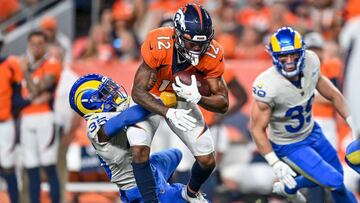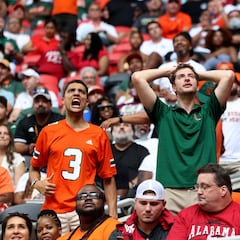What are the new rules for NFL 2021?
The NFL didn’t make any big rule changes for the 2021 season, opting to make some tweaks to improve the game. Here’s a look at what’s new...

The NFL introduced a handful of changes for the 2021 season after consulting all the parties involved in the game in an effort to improve the game and protect players.
Related news
- Which NFL stadiums will allow fans in for the new season?
- The Top unsigned free agents in the NFL
- Why decline a penalty in the NFL?
- How much money do NFL referees and cheerleaders make?
What are the new NFL rules for 2021?
There are no big changes to the rules for NFL games in 2021 but tweaks to how the players can block, formations on the field and communication on replays between the booth and officials.
No overtime in the preseason
The NFL has decided that preseason games, which don’t count towards the regular season, don’t need to go into overtime should the score be tied at the end of a game. It will be the first season since 1973 without preseason overtime.
Players have more freedom to choose Jersey numbers
The pandemic forced rule changes last season, one of which was increasing the practice squad to 16 players. Some of those players were allowed to be activated for games causing a run on jersey numbers. Certain positions will now be able to wear single-digit numbers, previously preserved for quarterbacks, kickers and punters. The new number list is as follows.
Running backs, tight ends, fullbacks, H-backs and wide receivers: 1-49 and 80-89
Defensive backs: 1-49
Linebackers: 1-59 and 90-99
Offensive linemen: 50-79
Defensive linemen: 50-79 and 90-99
One catch, if a player wants to change numbers for the 2021 season, they will have to buy out the existing stock of his jersey. However, if the player wants that number for the 2022 season it won’t cost that player a dime.
Increased communication on replays
There won’t be additional officials in the skybox to review video of plays on the field to catch what viewers at home see but often the officials on the field can’t. However, the replay officials will now be able to advise referees on a limited number of calls.
As the rulebook states the officiating department and replay officials “may consult with on-field officials, or conduct a replay review, advise the game officials on specific, objective aspects of a play when clear and obvious video evidence is present, and/or to address game administration issues.”
Put Brady in charge of the rules committee https://t.co/Kvu9J9mF4p
— Jon Ledyard (@LedyardNFLDraft) September 2, 2021
Illegal passing will result in loss of five yards and a down
Quarterbacks will not be allowed to pass the ball once they’ve crossed the line of scrimmage in 2021. Breaking the rule will cost the offensive team a down and a five-yard penalty from the spot of the pass. Also, if a quarterback throws the ball a second time during the same play, or makes a forward pass after returning behind the line of scrimmage the offensive team will lose five yards and a down. This will result in a safety if it occurs in the end zone.
Adjustments to kick formation
The NFL is performing an experiment in the 2021 season in an attempt to increase the on-side kick recovery rate which has plummeted since the kick formation rule change in 2018 denying players a running start before the ball was kicked. All receiving players will have to be behind their restraining line and inbounds, but eight and no more than nine must be within 15 yards behind the setup zone.
Use of helmet will continue to be a point of emphasis for @NFLOfficiating during the 2021 season.@richeisen breaks it down for the @NFL Video Rulebook: https://t.co/IJkiYNM00s pic.twitter.com/lfWUZERHBj
— NFL Football Operations (@NFLFootballOps) August 31, 2021
I recently picked the brain of ESPN officiating analyst John Parry to understand how 2021 NFL rule changes will, uh, change the game -- and how teams might capitalize for competitive advantage. The outside run/screen game got a big boost. https://t.co/oQH6N6UypK
— Kevin Seifert (@SeifertESPN) September 4, 2021
“Tight end box” for blocks below the waist
Related stories
To ensure more safety for players the NFL created an expanded “tight end box” where offensive players can't block below the waist and defensive players can't upend offensive players who are moving toward a block in the area. The area will now be “two yards outside of the normal tackle position and extends five yards on either side of the line of scrimmage.” Any blocks below the waist outside that area will result in a 15-yard penalty.
Tighter enforcement of taunting
The NFL is asking officials to make taunting a point of emphasis to improve sportsmanship. Two taunting penalties will result in the automatic ejection of a player. Furthermore, depending on the severity of the taunting, the sanctioned player may be subject to additional discipline.
The NFL's annual rule change and points of emphasis video notes game officials have been instructed to strictly enforce taunting rules in 2021. Two violations results in automatic ejection, with fines and even suspensions (!!) in play, too.https://t.co/aMafmvxwxt
— Tom Pelissero (@TomPelissero) August 10, 2021
